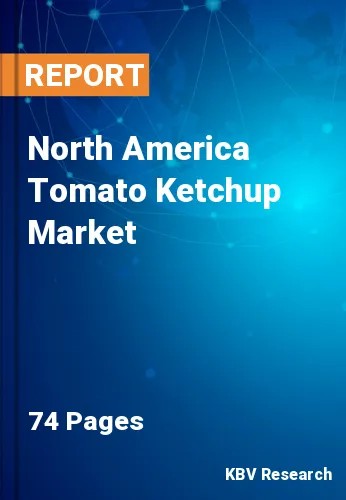The North America Tomato Ketchup Market would witness market growth of 1.2% CAGR during the forecast period (2022-2028).
The market is being driven by the burgeoning processed food sector and rising global demand for fast food. Furthermore, ongoing efforts to introduce flavored products with appealing packaging are driving up demand for tomato processed products in emerging nations. Moreover, the increased popularity of ready-to-eat food products has been a major driver of industry expansion.
Greater demand for organic tomato ketchup has resulted in increased sales of the product. As a result of this reason, prominent market players are developing new products. Furthermore, prominent market players are investing in and launching new varieties of ketchup to meet consumer demands by supplying products made from healthy and natural ingredients.
Tomato ketchup is a sweet and tangy sauce created from tomatoes, spices, sugar, herbs, and other ingredients. On occasion, it's simply referred to as ketchup. The rising use of tomato ketchup with various fast-food items by millennials and generation Z is driving the market.
Several fast food restaurants are attempting to create healthier menu options by using foods with higher nutritional value. In order to meet the expanding demand for fast food around the world, the fast-food business has seen a variety of trends and product debuts in recent years. Furthermore, the rising demand for fast food items in hotels, restaurants, and resorts will propel the fast food industry forward during the projection period.
The ketchup market is dominated by North America. People's changing lifestyles and dietary preferences, particularly in developed countries, are driving market expansion. Since tomato is native to North America and tomatoes are readily available as a raw material for ketchup, companies in the region rarely utilize tastes other than tomato. Furthermore, among all the sauces and condiments available, people in the region choose ketchup.
Ketchup use is growing in popularity as people's eating habits change and they consume more fast-food products including Chinese, continental, and other convenient snacking foods. The ketchup market will most certainly be impacted by this shift toward spending less time preparing food or opting for more convenient solutions. Ketchup use has surged as it has become a practical replacement for other sauces and condiments, owing to creative and simple packaging. Additionally, due to a high female employment rate in the US, all members of a household go out to work and most households do not have a designated homemaker. This increases the dependency of working people on fast food to satisfy their hunger. This has further increased the demand for tomato ketchup in the region.
The US market dominated the North America Tomato Ketchup Market by Country in 2021, and would continue to be a dominant market till 2028; thereby, achieving a market value of $5,795.8 million by 2028. The Canada market is estimated to grow at a CAGR of 3.5% during (2022 - 2028). Additionally, The Mexico market would display a CAGR of 2.6% during (2022 - 2028).
Based on Product Type, the market is segmented into Regular and Flavored. Based on Packaging, the market is segmented into Bottled and Pouch. Based on Distribution Channel, the market is segmented into Offline and Online. Based on countries, the market is segmented into U.S., Mexico, Canada, and Rest of North America.
Free Valuable Insights: The Global Tomato Ketchup Market is Estimated to reach $24.1 Billion by 2028, at a CAGR of 2.6%
The market research report covers the analysis of key stake holders of the market. Key companies profiled in the report include McCormick & Company, Inc., Conagra Brands, Inc., Nestle S.A., The Kraft Heinz Company, Unilever PLC, Del Monte Pacific Limited, Bolton Group S.r.l, Campbell Soup Company, General Mills, Inc., and Premier Foods PLC.
By Product Type
By Packaging
By Distribution Channel
By Country
Our team of dedicated experts can provide you with attractive expansion opportunities for your business.

